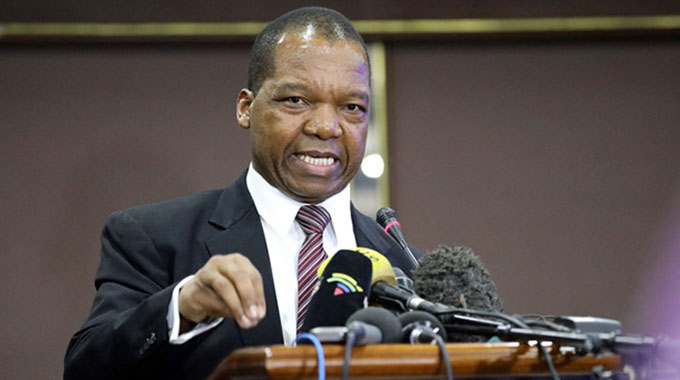RBZ directs sale of 20pc shop forex

Golden Sibanda Senior Business Reporter
Twenty percent of all new foreign currency taken by Zimbabwean businesses from local customers must now be liquidated at the official exchange rate, when deposited in a domestic foreign currency bank account, as part of the measures introduced by the Reserve Bank of Zimbabwe (RBZ) in the latest monetary policy statement.
Temporary measures taken a few weeks ago to limit abuse on mobile money platforms are now being made permanent.
Phone agency lines are permanently abolished; businesses can keep their merchant lines as one-way lines to receive money from customers, but have to move that money into their bank accounts to spend it; individuals are limited to total transactions of $5 000 a day; and phone companies are to ensure each person has just one wallet, thus banning the multiple wallets that have sprung up.
The bulk payment wallets will be approved for limited use, basically now value transactions and payment of the small humanitarian allowances to vulnerable members of society, but things like payrolls and other larger bulk payments must now go through the banking system.
At the same time, bureaux de change can now buy foreign currency at 5 percent above the auction rate, but now also have to sell 80 percent of their foreign currency holdings at each weekly auction, but they can set their own reserve price.
In his mid-term monetary policy statement, RBZ Governor Dr John Mangudya noted that the introduction of the auction system had ended the volatility of the foreign currency system and its exchange rates and that the auctions had provided over 87 percent of the foreign currency needs of importers since the auction system was introduced on June 23.
The stability in exchange rates, still below the parallel market rates of $90:US$1 to $120:US$1 seen before the auctions, had stabilised prices and brought inflationary trends crashing south. This now had to be sustained, hence the new measures and tweaking of the foreign currency and banking systems.
Following the decision to allow people to use free funds in foreign currency when buying goods and services, the voluntary dual payment systems introduced in March at the beginning of the Covid-19 emergency, Dr Mangudya said the RBZ was encouraged by the growth of foreign exchange balances in the domestic foreign currency accounts (FCAs) where businesses have to bank this money.
To ensure that some of the domestic-generated foreign currency is used to sustain the auctions, with immediate effect and going forward, 20 percent of the foreign currency receipts of providers of goods and services must now be liquidated at the point of depositing in the domestic FCAs.
But there are exceptions. “For the avoidance of doubt, all existing balances in the domestic foreign currency accounts will not be affected by this policy. This policy measure shall also not apply to recipients of free funds including individuals, embassies, non-governmental organisations, tobacco and cotton producers and domestic FCAs for fuel companies,” Dr Mangudya said.
The RBZ is further liberalising the activities of bureaux de change to enable them to enhance their business by increasing the exchange rate spread from the present 3,5 percent over the auction rate to up to 5 percent above the auction rate.
The bureaux de change will be required to sell at the auction, at their reserve price, 80 percent of their balances held every Monday.
On the basis of a forensic audit by RBZ, and the findings and recommendations brought up by the auditors, the bank will implement a cocktail of measures to bring the mobile money system under monitoring and control.
Regulations are already in place to put mobile money platforms under the sort of rules banks have been using for years.
Transactions by individuals shall be limited to $5 000 a day. Individuals shall be allowed to undertake person to person transfers, person to merchant payments for goods and services, settlement of bills and purchase of airtime.
But the rest of the 27 June temporary measures go permanent. The new measure is that following mobile money operators allowing illegal foreign currency dealers to use multiple individual wallets as a means to bypass the transaction limits, “mobile money operators shall, with immediate effect, close all multiple wallets, and allow just one wallet per individual,” Dr Mangudya said.
As they have been doing since June, retailers and other service providers will be permitted to continue operating one-way merchant wallets to allow the public to pay for goods and services using their phones and mobile accounts, but as has been the case merchants cannot make payments from their wallets and have to move the money to their bank accounts to use it.
“Agent wallets are no longer serving any legitimate purpose and were now being used primarily for illegal foreign exchange transactions. Agents’ mobile money wallets are therefore abolished, with immediate effect.
“Agents currently holding value in suspended and frozen wallets shall be allowed to liquidate the funds to their bank accounts, upon the Financial Intelligence Unit having satisfied itself of the legitimacy of the source of funds,” Dr Manguyda said.
Agents lines were originally created at the beginning of the mobile money platforms, when the purpose of the cash-in cash-out system was to transfer money.
As the mobile platforms became ubiquitous and dominated the transaction market, people stopped transferring cash and instead just sent money electronically, which their recipients spent electronically.
Agent lines then came to be used by cash barons and illegal pavement currency dealers.
Dr Mangudya said that mobile payment operators have been turning a blind eye and have even actively encouraged the abuse of bulk payment wallets for illegal foreign currency trading transactions, thus earning lucrative transaction fees in the process.
Going forward, bulk payment wallets will be approved by regulatory authorities for limited use, primarily for low value transactions and humanitarian funds disbursements to vulnerable members of the society.
Any other bulk payment transactions, such as payment of salaries and wages, shall be processed through normal banking channels.
Reflecting recent developments on the foreign exchange auction, blended annual inflation is forecast to gradually fall to 249 percent by December 2020 and further to single digit levels by December 2021. This is because inflation measures the difference in the cost of living between two points a year apart.
The spell of almost level prices for the past two months is pulling inflation down as this near zero rise is lower than the same two months last year.
As prices move very slowly, the monthly jumps for the rest of this year and for next year will be far less than the monthly jumps in the second half of last year and the first half of this year, so the price rise between two equivalent months will be progressively lower as the “made-prices” bulge moves out of the calculations.
Zimbabwean inflation, with the imposition of fiscal discipline by the new administration almost two years ago, has been almost entirely cost-push rather than the past demand-pull, with the exchange rate providing the push, or more precisely the expected exchange rate on the black market.
With far more stable official rates, and 87 percent of imports funded through auctions, that push is now very weak.









Comments